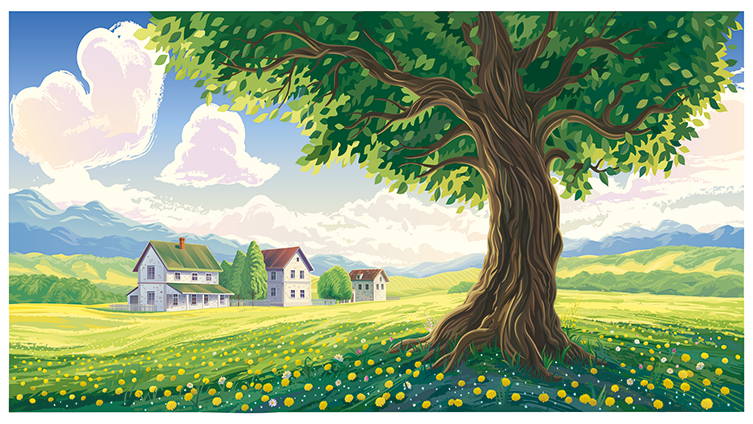Under Two Shires Oak – Episode 01

Under Two Shires Oak
- 1. Under Two Shires Oak – Episode 01
- 2. Under Two Shires Oak – Episode 02
- 3. Under Two Shires Oak – Episode 03
- 4. Under Two Shires Oak – Episode 04
Summer 1946
FOR centuries the old oak had straddled the border between the counties of Derbyshire and Nottinghamshire. A visitor standing beneath its gnarled old branches on a sunny day might fancy the rustling leaves above were whispering one to another in the summer breeze.
If this were so, no doubt they’d sometimes chat about the doings of the many others who’d passed this way. Stately homes, tenant farms, dark mines, villages smoke-grimed and villages pretty as a painting . . . from its topmost branches Two Shires Oak could glimpse them all. And most folk had at one time stood beneath its boughs.
The three girls who stood, dappled in sunlight, under its canopy one June afternoon were on the brink of their adult lives. Grace, the oldest, had turned seventeen just weeks earlier, Evie would reach the same age in the autumn, whilst Francesca, the youngest, wouldn’t do so until next spring.
The year was 1946, and the nightmare winter of that year, which would be talked about into the next millennium, was yet months ahead. In the sweet warmth of this summer the mood of optimism in the country had not passed the trio by.
But was there perhaps another reason for the extra flush today around the one who worked over at the big house, the one with hair the colour of chestnuts?
* * * *
Francesca noticed immediately the sparkle of Grace’s smile.
“Have you seen Philip this morning?” she asked her friend, her tone teasing. “He couldn’t take his eyes off you last night.”
“Don’t be daft!” Grace said. “Me in my servant’s uniform, and your lot in your fine frocks! It would be you Mr Philip couldn’t take his eyes off.”
Francesca pushed a section of silky blonde hair back behind an ear.
“It certainly was not me, though I think that might have been his awful stepfather’s intention. This is the first year my family has been invited to the annual ball at the Hall. We have never been considered quite good enough until now.”
Grace and Evie looked at her with curiosity, particularly Evie. As a maid in an aristocratic household, Grace had witnessed the superior attitude of some of those who had titles – like Lord Alderarche, who had recently married Philip’s widowed mother – towards those who merely had wealth, like Francesca’s father.
Evie’s own father, like most of the men in their village, worked in the coal mine owned by Francesca’s family. To her, it seemed amazing that they could be deemed in any way inferior.
Evie mused, twiddling a lock of her hair which, in contrast to her friends’ was what her father once described as “black as t’coal in t’ mine”.
“It’s the war that’s done it,” she finally said. “I heard my dad talking. Things is going to change for the miners, he said. For the landed gentry, too. More of them are going to have to find rich husbands for their daughters and rich wives for their sons.”
“Well, they can forget me!” Francesca interrupted. “I would rather remain a spinster of the parish than have someone like Lord Alderarche as my father-in-law!”













